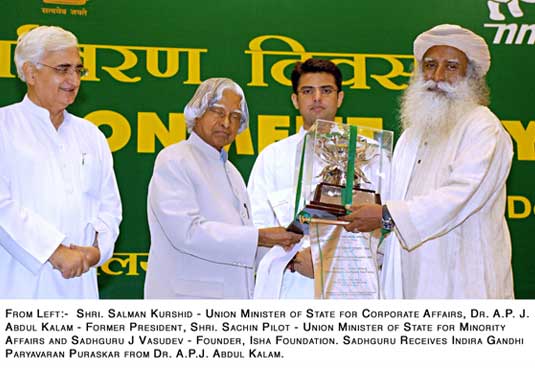On World Environment Day, the Isha Foundation, founded by Sadhguru, received India's highest recognition for environmental work: the Indira Gandhi Award. Through its Project GreenHands initiative, Isha Foundation has mobilized over 2 million volunteers to plant 8.2 million trees in Tamil Nadu, India; efforts which have resulted in setting a Guinness Book of World Record.

I have been hearing many things at any number of conferences where people are talking about the environment, water issues and other dangers we are facing. But what pains me is that no government wants to address the most fundamental problem. That is, from the early 20th century, the world's population was 1.4 billion and today, one century later, we are 7 billion. We are projecting that by 2050, we will be 9.6 billion people. I think this is irresponsible reproduction of humanity.
In India, in 1947, the population was 330 million. Today, it is 1.2 billion. It doesn't matter how many trees we plant, how many policies we change, what kind of technologies we bring, unless we consciously put a cap on human populations, there is really no solution. Either we control our populations consciously, or nature will do it in a very cruel manner. There is no choice.
Particularly right now, 52% of land in India is plowed to feed this 1.2 billion people. It's a fabulous fact that our farmers, with rudimentary infrastructure -- with totally ramshackle infrastructure -- are producing food for over 1 billion people. This is an absolutely commendable fact. But still, the men and women who produce food are not eating properly. That is not a commendable fact; that is not something to be proud of. The people who produce food for all of us -- the rice, grain and wheat that we eat today -- their own children do not enjoy a full stomach. And this is essentially because we have not taken the responsibility of deciding, "Okay, we have this much land -- how much population can we support?" Definitely, the land cannot support endless growth of human populations.
Our next stage of development is very touchy for various reasons -- political reasons, religious reasons, so many things. But we are thinking of asking villages to consciously take up "no conception" years, to voluntarily take such a step. Even if 50% of the people commit, it will still make a difference.
Sadhguru accepting India's highest recognition for environmental contribution - The Indira Gandhi Award -- on World Environment Day
By international standards, the average requirement of forest to take care of one human being -- just to take care of his breath -- is 1.4 hectares of land. But in India, we have only 20% of the actual requirement of forest for each individual human being. So are we going to plant the whole Indian landscape with forest? Definitely it's not going to happen, and it's not practical. The only thing we can do is, "Are we going to adjust our population to the resources that we have?" That is all we can do. And that is the easiest thing to do. That is something that every human being can do if the necessary education and awareness is brought into their lives.
If that investment is made, we don't have to plant trees. If we stay away from the land, in 25 years if nobody enters a building, trees will grow through the concrete. You cannot stop it; they're resilient. The planet is not in peril, it is only human life which is in peril; this is something human beings need to understand. People are going about projecting, "The planet is in danger!" The planet is not in any kind of danger. It is only human life which is in danger. I hope we wake up to this fact and do what is needed.
Of course, governments have to make policies, but they cannot enforce these kinds of things in a democracy. It can only be done by campaigns, by bringing the necessary awareness. There was a time when India was campaigning for a planned family. You don't see any of this anymore, it's as if we have reached a solution, but I remember in the 1970s and 1980s, wherever you go, you would see family planning slogans on every truck. Where has this gone? Have we solved the problem? We have multiplied the problem, isn't it?
So without controlling human populations, talking about ecology, land conservation and water conservation will not get us there because the kind of impetus that is there today in the form of science and technology is making every human being super-active. Hyper-active. You cannot cap human activity; you can only cap human numbers; there is no way we are going to cap human activity because that will amount to capping human aspirations. And today, everybody has large dreams and aspirations that cannot be accommodated at the current levels of population unless we strive for a more conscious way of determining where we want to stop. And I don't think that is impossible.
Well, we're nice but we're too many. And as I land in Chennai and drive from the airport, I see neon signs advertising fertility clinics. So much for god-given children! If it is Him, if you know a prayer, please tell him to slow down the production line.
--
WATCH: Isha Outreach projects in rural India.
--
Sadhguru will post a weekly article covering such topics as health and wellbeing, cultivating meaningful relationships, living joyfully, enhancing human consciousness and how to make this planet a better place to live.
Email questions to: MysticEyeHP@ishafoundation.org
--
Join the Facebook Page: www.facebook.com/MysticEyeHPReceive updates on Twitter: www.twitter.com/ishafoundationSee videos of Sadhguru: www.youtube.com/ishafoundation
View Amazon Bestseller Midnights with the Mystic below
